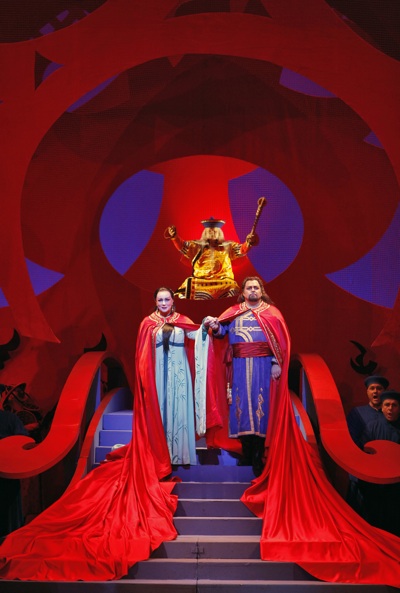Stunning voices at War Memorial Opera House
A mesmerizing production of Turandot by the San Francisco Opera emphasized the right stuff—brilliant singing—in a fantasy setting worthy of Disney. Giacomo Puccini’s final opera had a story line that was tough to swallow, but it was a surprising fit for David Hockney’s lurid sets.
Hockney has made a career out of carefully thumbing his nose at the establishment, and Wednesday night at the War Memorial Opera House was no exception. Cartoonish and bright-crayon colored, one audience member described them as “Dr. Suess meets Ruffles potato chips.” But they worked.
And more to the point, Nicola Luisotti’s conducting was enthusiastic, the principals were awesome and the lighting was heavily atmospheric. And the cast of what seemed like thousands? Charming children, bloodthirsty villagers, nearly naked muscle men, a forbidding executioner, and one lovelorn slave: in a word, captivating!
Set in ancient Beijing, Puccini based his opera on Carlo Gozzi’s play about infatuation and power, but added the key figure of Liu as the young slave who embodies a love so pure it kills her… love for a somewhat careless tenor. Sung by Leah Crocetto in a voice both willowy supple and tightly crafted, her Liu was an astonishing feat for the young singer. In her final aria she shaped the phrases to powerful effect, particularly stunning in her soft and penetrating notes.
The two principals, Iréne Theorin as the icy princess Turandot and Marco Berti as the love-struck Calaf, brought vocal and emotional heft to their strange roles: one corrupted by power and the other lusting to possess it. Berti sang the famed “Nessun dorma” (no-one sleeps) in top form, replacing a tenor’s usual edge with real depths. Theorin was amber-hued, even in the highest notes: rather than the ice that often commands that high tessitura, her honeyed tones underscored the wounded core of the despotic princess.
The story was riveting from the opening, when villagers gathered to wait for moonrise—the moment when Princess Turandot’s latest suitor is to be beheaded for failing to solve her three riddles. We soon swallowed that outrageous premise with the aid of Puccini’s intriguing blend of Italian aria and Chinese folk song. The villagers, who combined the excellent singing of the San Francisco Opera Chorus with some scary acting, entreated the rise of the moon, “… O Sickly visage… O lover of the Dead,” a chilling shift from the more usual metaphor of Moon as mistress of love and madness.
But then came the first of three reversals: the villagers saw the Persian prince walking head high towards his doom and cried to Turandot for mercy. Their change of heart is so human and so sudden that it sets Puccini’s hook, one he baits with Persian scales and middle-eastern arabesques.
But as complexity swelled mid-stage, another prince, Calaf, entered the foreground, stumbling across a blind man being led by a slave—which he recognized as his long-lost father! Their reunion was cut short as the executioner appears, wielding an immense sword, which he proceeds to grind—and here is Hockneys’s mating of caricature and magic: the grindstone, carried by four thonged peons, is faced with a black and white spiral, swirling hypnotically to the hot spray of sparks.
Turandot appeared as Calaf added his voice to the villagers, begging her to reconsider the prince’s fate. Glorious in full regalia, she stood silently, then slashed her hand to indicate an executioner’s chop. And the second reversal: Calaf, struck by beauty mated to absolute power, entered her deadly riddle game.
And the third turn-about? I wouldn’t wish to spoil the intrigue, but it wouldn’t be opera without death and amore, each of which has its day.
Beer, hotdogs and opera:
There will be a free live simulcast at San Francisco’s AT&T Park on Sunday Sept 25 at 2:00 p.m. Last year over 30,000 people came, spilling onto the field to see Il Trovatore. This Turandot is well worth the trek south of Market. More information, and printable early-entry passes, available at www.sfopera.com.
—Adam Broner
Photo from Act III of Turandot: soprano Iréne Theorin, left, and tenor Marco Berti, Joseph Frank as the emperor; photo by Cory Weaver.
